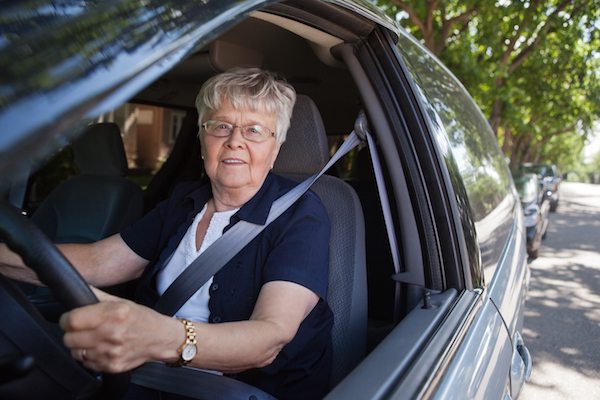Seniors Behind the Wheel

Many factors make driving unsafe from time to time for all of us. Bad weather, medications, dusk & dawn, and aging and youthfulness all impact safety. Young, first time drivers often experience the most accidents and fatalities. However, the Federal Highway Administration reports that drivers age 70 and older are next in line for motor vehicle fatalities. While many older Americans learn to compensate for any limitations, sometimes it becomes necessary to let someone else do the driving.
Deciding when to take the step of turning over the car keys is a big one. You may simply start by limiting night-time driving, and adjust to the changes, and schedule errands accordingly.
Here’s some signs that may signal that it’s time for a change of habits behind the wheel.
Safe Driving Checklist
- Is the speed limit maintained?
- Are there signs of nervousness, or being anxious behind the wheel?
- Are alternate routes maintained, instead of the highway?
- Running stop signs and/or lights?
- Have neighbors observed or commented on any unsafe driving behaviors?
- How are the eyes? As we age, our eye sight deteriorates
- Are there any dents or scratches on the car that can’t be explained?
- Are there dents or scratches on garbage cans or the side of the garage?
- Does your loved one seem unwilling to discuss his or her driving habits?
- Do they seem to be driving less though not admitting it?
If the answer is yes to several of these questions, it is possible it’s time to have a conversation with your family member. Though they may not fully accept your suggestion, preventing harm to your loved one and others is the ultimate goal. Share your concern for their safety and the safety of others. If you feel there may be health concerns that may be creating driving issues, be sure to consult the family physician.
Remember that you’re asking that they relinquish a part of their independence so be patient, loving and kind as you go through this process. Discussing your parent’s driving capabilities is not going to be a comfortable conversation. Without the ability to drive, your loved one may feel helpless and frustrated. It is important to remember that your parent’s safety and the safety of all those on the road are at risk when an impaired driver is behind the wheel. Revoking your parent’s driving privileges may result in an increased burden to you, but it is a small price to pay when you consider the alternative.
- How Seniors Can Feel Empowered in a Digital World with Accessible Technology
- February Is American Heart Month
- Thriving as a New Caregiver: Self-Care Secrets Revealed
- Bridging the Gap: Supporting Seniors Without Nearby Family
- Distance Caregiving Simplified: Modern Strategies for Compassionate Support
FREE BROCHURE Today!
